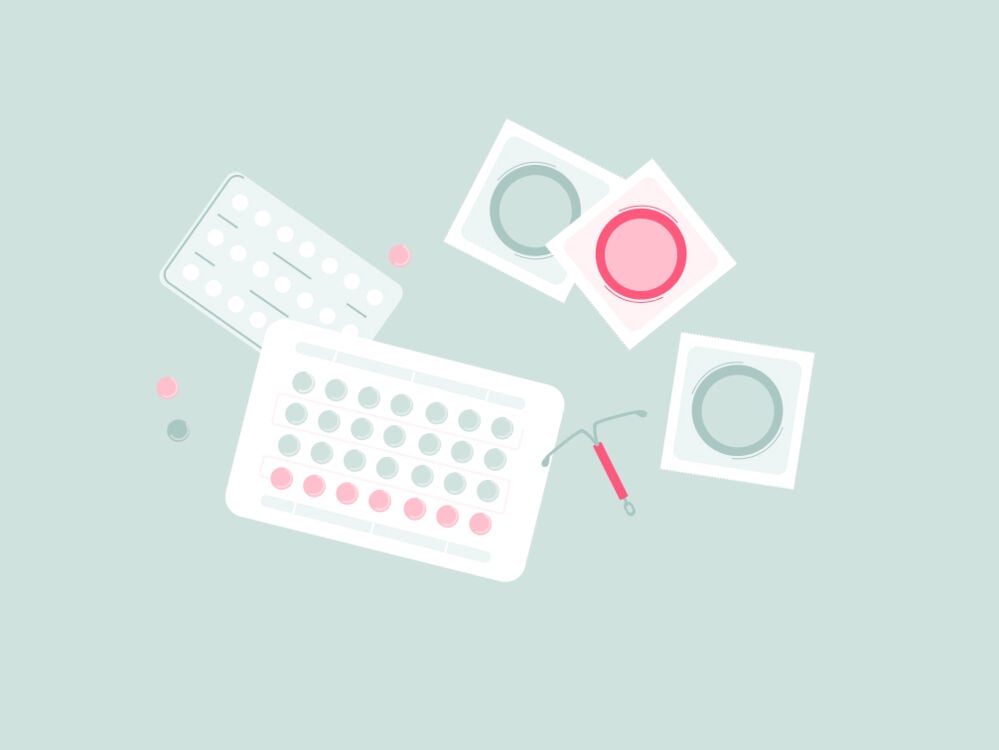Sex for the first time can be nerve-racking, but does it always hurt? Here’s the lowdown.
-
Tracking cycle
-
Getting pregnant
-
Pregnancy
-
Help Center
-
Flo for Partners
-
Anonymous Mode
-
Flo app reviews
-
Flo Premium New
-
Secret Chats New
-
Symptom Checker New
-
Your cycle
-
Health 360°
-
Getting pregnant
-
Pregnancy
-
Being a mom
-
LGBTQ+
-
Quizzes
-
Ovulation calculator
-
hCG calculator
-
Pregnancy test calculator
-
Menstrual cycle calculator
-
Period calculator
-
Implantation calculator
-
Pregnancy weeks to months calculator
-
Pregnancy due date calculator
-
IVF and FET due date calculator
-
Due date calculator by ultrasound
-
Medical Affairs
-
Science & Research
-
Pass It On Project New
-
Privacy Portal
-
Press Center
-
Flo Accuracy
-
Careers
-
Contact Us
Does sex hurt the first time? Your questions answered


Every piece of content at Flo Health adheres to the highest editorial standards for language, style, and medical accuracy. To learn what we do to deliver the best health and lifestyle insights to you, check out our content review principles.
Key takeaways
- The first time you have sex, it might feel awkward, nerve-racking, or physically uncomfortable, but it shouldn’t be too painful.
- You might feel discomfort and possibly bleed a little because your hymen might tear a bit. Not everyone experiences this, though.
- There are plenty of things you can do to make your first time as enjoyable as possible. Remember: sex should be fun and pleasurable, not painful!
Does it hurt the first time you have sex?
You might have heard that first-time sex is painful or uncomfortable but not be sure why. Well, it may come down to a few different factors. If you feel a little bit nervous before you have sex, then your body may tense up, making penetration more difficult and uncomfortable. One thing you might be worried about is that your partner’s penis may be too big or that it will hurt you. While this can sound daunting, try not to worry. This is possible, but it’s very rare.
Similarly, you might have heard the term “popping your cherry” in relation to bleeding and discomfort during sex but not be sure what that means. Prepare for a bit of a biology lesson. The hymen is a thin, ring-like membrane that can partially or fully cover the entrance of the vagina. Like other parts of your body, no two hymens are alike — they can vary in size, thickness, and elasticity. When the hymen is penetrated, it can stretch and tear, which can lead to a small amount of bleeding and discomfort. This isn’t the same for everyone, though — your hymen may stretch or tear, and you may not notice at all.
Sex isn’t the only reason why your hymen might stretch. Other reasons include:
- Using tampons or a menstrual cup
- Having a pelvic exam or Pap smear
- Doing activities like swimming, cycling, playing football, and horse riding
- Masturbating
What about experiencing pain after sex?
Typically, people may experience pain during sex very temporarily. This can be uncomfortable and scary, so if you’re worried at any point, speak to your health care provider. They’ll be able to guide you on the best next step.
Other causes of painful sex
Some medical conditions can make penetrative sex painful. Such as:
- Endometriosis
- Fibroids
- Vaginismus
- Ovarian cysts
- Vulvodynia
- Allergies
- Skin disorders
- Yeast infection
- Sexually transmitted infection (STI)
- Pelvic inflammatory disease (PID)
Pain during or after sex is often your body’s way of telling you something’s going on with it. It’s understandable if you feel a bit embarrassed about it, but it’s important to reach out to your doctor so they can figure out what’s going on.
Things to consider before having sex for the first time
First-time sex can feel like a big deal even before you consider that it might be slightly uncomfortable. Here are six tips you can consider when you’re having sex for the first time.
Discuss sex with your partner
Ideally, it’s best to talk about sex with your partner before you do it. Discuss what you like and don’t like, what you’re willing to try, and plans for safer sex, e.g., what birth control method you will be using. Communication is the key to ensuring a consensual and pleasurable experience for both of you. This might make you feel vulnerable, but it’s so important that you’re open with your partner beforehand about boundaries and protection.
Warm up beforehand
Spend time touching and kissing each other’s bodies to ensure you’re fully turned on. Part of your body’s natural arousal response is vaginal lubrication, or “getting wet." Being sufficiently wet reduces friction and makes penetration more pleasurable. You can also use lube to make sex more comfortable. The amount of natural lubrication your body produces can be different from experience to experience and person to person. “Wetness” doesn’t correlate to how aroused you are or how into your partner you are. Lube can help you to avoid friction or dryness.
Try different positions
A painful first time could be due to the position. If you feel like penetration is too deep, don’t be afraid to switch things up.
Set realistic expectations
Many people have high expectations for their first time to be special and memorable. Some people have a mental checklist to determine when they’re ready and plan where and when it will happen. These are reasonable things to do, but it’s equally important to be realistic. Be fair to yourself and your partner, and try to be in the moment when it happens.
There's no need to hurry: Take it slow
Be patient with your partner and with yourself, and try not to take any thoughts about how you should feel too seriously. You may have expectations of yourself, your partner, and how things should go, but take a minute to relax. Find a pace and rhythm that suits you both — there’s no need to rush.
Communication is key: Voice how you’re feeling
The most important thing — whether it’s your first time having sex or your hundredth time — is to ensure everyone involved is consenting. Check in with each other before, during, and after sex to ensure you’re both having a good time and are happy to keep going. No one should have to have sex that feels painful or wrong, so if something doesn’t feel good or you just change your mind and want to stop, you can and should tell your partner.
Important safety precautions
Aside from being enjoyable and pain-free, your first time should also be safe. Sex has many benefits, but it also comes with a few risks. Even if it’s your first time, unprotected sex can lead to unwanted pregnancy and STIs, so it’s important to use protection.

Preventing STIs
You can protect yourself and your partner from STIs and unwanted pregnancy by using a condom and other methods of barrier contraception. Barrier methods (contraception that physically stops the sperm from reaching the egg) are the only form of contraception that can help prevent STIs.
It might feel awkward and unfamiliar to broach the topic of contraception with a partner, but they should respect what you have to say. It’s always okay to take things at your own pace, and you should never feel pressured into having sex without a condom, just like you shouldn’t feel pressured to have sex at all.
Preventing unwanted pregnancy
It’s a common myth that you can’t get pregnant if it’s your first time, but pregnancy can happen anytime you have unprotected sex, even if you’re on your period (although it’s unlikely). Condoms are a great way to prevent unwanted pregnancy, but there are plenty more forms of birth control. You can speak to your health care provider about the best type of birth control for you.
Is pain during first-time sex a one-time thing?
So, when does sex stop hurting? For many people, pain during sex is temporary and becomes less and less uncomfortable over time. However, if you experience pain every time you have sex or you notice bleeding afterward, contact your health care provider. They may examine any other symptoms you have (such as abnormal discharge, dryness before or during sex, or potential allergies) and figure out the best next step for you.
FAQs
How long should you bleed after your first time?
Although it’s pretty common, not everyone bleeds when they have penetrative sex for the first time. The bleeding might look like light spotting. If it’s very heavy, it’s worth seeing your health care provider to ensure nothing more serious is going on.
What changes after losing your virginity?
First-time sex can bring up a range of emotions, and it’s important to make sure you feel ready and comfortable before being intimate with a partner. Despite the name, you won’t “lose” anything when you have sex for the first time, but it can still feel like a really big deal. And sex can be defined as penile-vaginal intercourse or penetrative sex, but it also encompasses all sexual acts (like oral and using your fingers).
How do you know if your hymen will break?
The first thing to note is that the hymen is a stretchy and flexible membrane, so it doesn’t “break.” Sometimes (not always), the hymen can tear when you have penetrative sex for the first time. The hymen can also stretch and tear for reasons unrelated to sex, like while playing sports or using a tampon. If your hymen tears when you have sex for the first time, you might feel a bit of pain or discomfort and even bleed a little bit — or not.


Hey, I'm Anique
I started using Flo app to track my period and ovulation because we wanted to have a baby.


The Flo app helped me learn about my body and spot ovulation signs during our conception journey.


I vividly
remember the day
that we switched
Flo into
Pregnancy Mode — it was
such a special
moment.
Real stories, real results
Learn how the Flo app became an amazing cheerleader for us on our conception journey.
References
“Sex and Consent.” Brook, www.brook.org.uk/your-life/sex-and-consent/?gclid=Cj0KCQjw3JanBhCPARIsAJpXTx5EI83EZZ2bEdzoMlgsg_WxJLambUXT6U9p18FrTx7WQtEvRswKvJMaAut9EALw_wcB. Accessed 5 Sep. 2023.
“Barrier Methods of Birth Control: Spermicide, Condom, Sponge, Diaphragm, and Cervical Cap.” The American College of Obstetricians and Gynecologists, Apr. 2022, www.acog.org/womens-health/faqs/barrier-methods-of-birth-control-spermicide-condom-sponge-diaphragm-and-cervical-cap.
“Vaginal Sex.” Brook, www.brook.org.uk/your-life/vaginal-sex/. Accessed 5 Sep. 2023.
“Birth Control.” The American College of Obstetricians and Gynecologists, www.acog.org/womens-health/healthy-living/birth-control. Accessed 5 Sep. 2023.
“Can a Penis Be Too Big for Sex?” SextEd, 20 Dec. 2022, sexted.org/faq/can-a-penis-be-too-big-for-sex/.
“Can I Get Pregnant Just after My Period Has Finished?” NHS, www.nhs.uk/common-health-questions/pregnancy/can-i-get-pregnant-just-after-my-period-has-finished/. Accessed 5 Sep. 2023.
“Having Sex for the First Time.” Brook, www.brook.org.uk/your-life/having-sex-for-the-first-time/. Accessed 5 Sep. 2023.
“Does a Woman Always Bleed When She Has Sex for the First Time?” NHS Collingwood Health Group, collingwoodsurgery.nhs.uk/collingwood/common-questions/sexual-healthdoes-a-woman-always-bleed-when-she-has-sex-for-the-first-time. Accessed 5 Sep. 2023.
“Dyspareunia (Painful Intercourse).” Cleveland Clinic, my.clevelandclinic.org/health/diseases/12325-dyspareunia-painful-intercourse. Accessed 5 Sep. 2023.
“Sex Shouldn’t Hurt.” American Sexual Health Association, www.ashasexualhealth.org/dyspareunia-sex-hurts/. Accessed 5 Sep. 2023.
“Hymen.” Cleveland Clinic, my.clevelandclinic.org/health/body/22718-hymen. Accessed 5 Sep. 2023.
“Sexual Response Cycle.” Cleveland Clinic, my.clevelandclinic.org/health/articles/9119-sexual-response-cycle. Accessed 5 Sep. 2023.
“Stress Effects on the Body.” American Psychological Association, 8 Mar. 2023, www.apa.org/topics/stress/body.
“The Benefits of a Healthy Sex Life.” Oregon Health and Science University, www.ohsu.edu/womens-health/benefits-healthy-sex-life. Accessed 5 Sep. 2023.
“What Causes a Woman to Bleed after Sex?” NHS, www.nhs.uk/common-health-questions/sexual-health/what-causes-a-woman-to-bleed-after-sex/. Accessed 5 Sep. 2023.
“Which Method of Contraception Suits Me?” NHS, www.nhs.uk/conditions/contraception/which-method-suits-me/. Accessed 5 Sep. 2023.
“Why Does Sex Hurt?” NHS, www.nhs.uk/common-health-questions/sexual-health/why-does-sex-hurt/. Accessed 5 Sep. 2023.
“When Sex Is Painful.” The American College of Obstetricians and Gynecologists, Sep. 2017, www.acog.org/womens-health/faqs/when-sex-is-painful.
“You Asked It: Dry Down There.” Mount Sinai Adolescent Health Center, 24 Aug. 2020, www.teenhealthcare.org/blog/you-asked-it-dry-down-there/.

